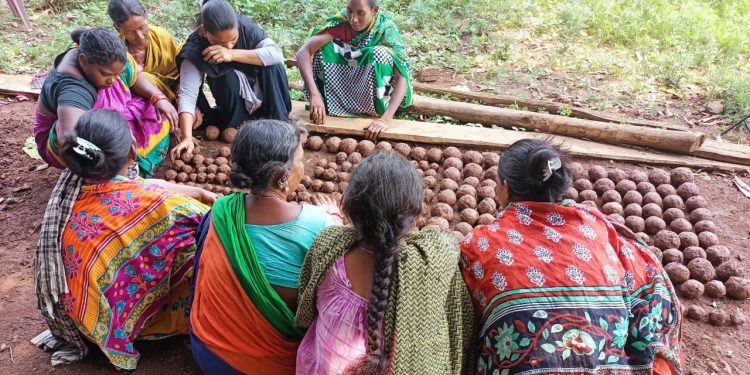Daringbadi: Awareness about environment conservation is growing among indigenous communities in the tribal-dominated region of Daringbadi in Kandhamal district, as large patches of forests have been wiped out in several villages due to the effects of climate change.
Realising the adverse impacts of deforestation, tribal women across various panchayats have taken the lead in rejuvenating forest lands. Through an initiative involving the preparation and dispersal of seed balls—locally known as bihana mati pindula — they aim to restore degraded forest areas, including the barren ‘Landa hills’.
These seed balls are created using a traditional organic method, mixing soil and compost with seeds. The balls are then dispersed across deforested areas, offering a simple yet effective technique for forest regeneration. According to the women involved, this method not only protects the seeds from harsh climatic conditions but also improves the chances of germination and survival.
Also Read: Showcasing tribal life: Homestay push gains ground in Kandhamal
Local voluntary organization Jagruti, while working under the state government’s forest land rights initiative, is making collaborative efforts with tribal women in reviving native tree species that are on the verge of disappearing. Seeds of such trees are being collected and turned into seed balls which are then scattered across deforested and vacant forest land. These seed balls are expected to germinate naturally, restoring vegetation in the region.
The trees targeted for restoration include species such as barada saag, siali lata (Bauhinia vines), harida (Terminalia chebula), amla (Indian gooseberry), bahada (Terminalia bellirica), kendu (Diospyros melanoxylon), jamukoli, bel (Wood apple), tentuli (tamarind), mahul (Mahua), bhalia, piasala, dimbiri, banyan, and simili (silk cotton), among others. Seed balls are also being prepared for indigenous fruit trees such as desi amba (local mango), panasa (jackfruit), lembu (lemon), aat, sitaphala (custard apple), and ram phal (Annona reticulata), to help preserve and regenerate these native species.
According to Pradeep Kumar Kanhar and Kamini Pradhan – area resource persons in charge at Danekabadi panchayats – the seed balls are being planted in open forest patches to ensure the natural regeneration of lost biodiversity.
The movement is more than just a plantation drive; it reflects a deeper understanding among the tribal population about the crucial role forests play in preserving biodiversity, mitigating climate change, and supporting sustainable livelihoods. The women believe that restoring forests will also help sequester carbon and strengthen essential ecosystem services.
Currently, tribal women from the Danekbadi, Sonapur, and Badabanga panchayats are actively participating in this green mission under the guidance of their local Forest Management Committees. Their dedication and grassroots mobilisation efforts underscore the significance of community-led conservation in achieving long-term environmental resilience.
PNN






































